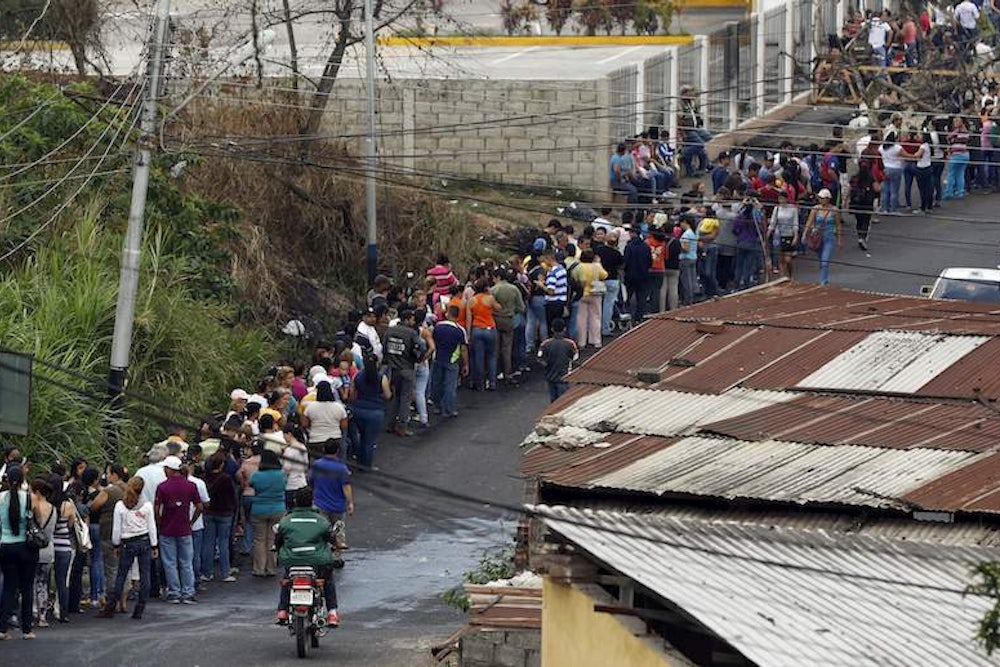A recent New York Times article about the protests in Venezuela reported that "demonstrators condemn a wide range of perennial problems, including… shortages of basic goods like sugar and toilet paper." This has become a meme in coverage of the unrest, as just about every story mentions these "shortages" as a reason for the student demonstrations. The word has become a kind of shorthand for the chaos and decay of the Venezuelan economy, driven by bolivarian socialism's uniquely self-destructive mix of economic policies. But how, you might wonder, does government policy cause a toilet-paper crisis?
Any journey down the rabbit hole of chavista economic management has to start with Venezuela's deliriously dysfunctional currency exchange control system. Unlike a normal country, where you can trade U.S. dollars with local currency at whatever price the market will bear, the Venezuelan bolivar is fixed at 6.30 per dollar, and sold discretionally, only to those the government deems worthy. This worthiness is established on the basis of an enormously cumbersome and corruption-prone administrative process.
The real problem isn't the red tape, though. The real problem is that 6 bolivars and 30 cents is an insanely low price for a U.S. dollar. Venezuelans will gladly pay 85 bolivars for a dollar, even though doing so is technically a crime punishable by up to 6 years in prison.
Having two prices for the dollar makes figuring out what things cost in Caracas something of a philosophical imponderable. The Economist Intelligence Unit's 2014 Worldwide Cost of Living survey, released Tuesday, ranked Caracas the sixth-most expensive city in the world—tied with Geneva, Melbourne, and Tokyo. Of course, that's only if you figure it at the official exchange rate. At the more realistic black market rate, as EIU itself notes, Caracas is one the cheapest big cities on earth.
How price controls turn Venezuelan importers into financial arbitrageurs, who make basically all their money from currency manipulation, is complicated and perhaps best explained through an example. Let's take butter.
In Venezuela, butter is price-controlled at 109 bolivars a kilo. As usual, whether that's a lot or a little depends on which exchange rate you use. At the official exchange rate, that's an extortionate $17 per kilo of butter, around five times the international wholesale price. On the black market, it's just $1.23 per kilo.
Here's the tricky bit: If you can persuade the state to sell you $17 to import butter, you'd have to be insane to spend it on five kilos of butter that you can only sell for 545 bolivars, because that same $17 in the hands of your local black market currency operator will buy you almost 1,450 bolivars.
As it turns out, there's a simple fix: fudging the receipt. Say you import 1 kilo of butter—just get your foreign supplier to give you paperwork showing you've imported 2 kilos. The first $17 will buy 5 kilos of butter and net you a modest 545 bolivars. But the second $17 you can sell on the black market, for 1,450 bolivars. In this example, 73 percent of your income comes from the currency deal rather than the sale of butter.
Sure, some of that will have to go to bribes to get officials to certify that you imported twice as much as you actually did, but that's all in a day's work. Data on this is impossible to get, of course, but anecdotally it seems that virtually every importer in Venezuela, both in the private and the public sector, does some version of this scam.
It's easy to see how the actual butter becomes an afterthought in a deal like this. The more the official and black market exchange rates diverge, the bigger the profits to be made out of dollar arbitrage, the more onerous the clean part of the business becomes. In the end, "butter importers" are no such thing: They're currency arbitrageurs, with a loss-making side-business in butter imports.
Which explains why shoppers in Caracas have found it nearly impossible to find actual butter in the shops for months now. And of course it's not just butter. It's sugar and flour and chicken and cooking oil and, yes, toilet paper. It's spare parts for cars and machinery. It's anti-retroviral drugs for HIV-positive patients. It's airline tickets and industrial chemicals and MP3 players and sanitary pads. In Venezuela these days, if it's price-controlled, it's hard to find.
And when a price-controlled good does finally get delivered to a store, word spreads like wildfire on social media and on streetcorners. Consumer flashmobs form in a matter of minutes.
At first, enormous lines would form inside stores, all for one hard-to-find item, but more recently store owners have been creating separate lines outside the store just for scarce goods. These are the epic lines you've seen in the press, snaking down the street for up to a mile—and occasionally causing fistfights.

Government propaganda has long blamed the escalating shortages on an "economic war" launched by the CIA, alongside the economic elite, to topple a brave but embattled revolutionary people's government. But importers—many with close links with the regime—skirt currency controls not to destabilize the government, but because government policy makes skirting controls fantastically profitable. For this, President Nicolás Maduro's administration, like Hugo Chavez's before it, has no one to blame but itself: the way arbitrary price controls—and especially price controls on foreign currency—multiply perverse incentives, punish honest work, and channel outsized profits to people doing work of no value to society is one of the best understood phenomena in all of economics.
As anger over this economic chaos spills out into the streets, it's worth noting that widespread inflation, shortages, and misallocation of resources weren't just predictable: They were predicted, loudly and repeatedly. The leaders of the bolivarian revolution took great pleasure in mocking those of us who did the predicting. Now the shit is hitting the fan, and there's no toilet paper.
